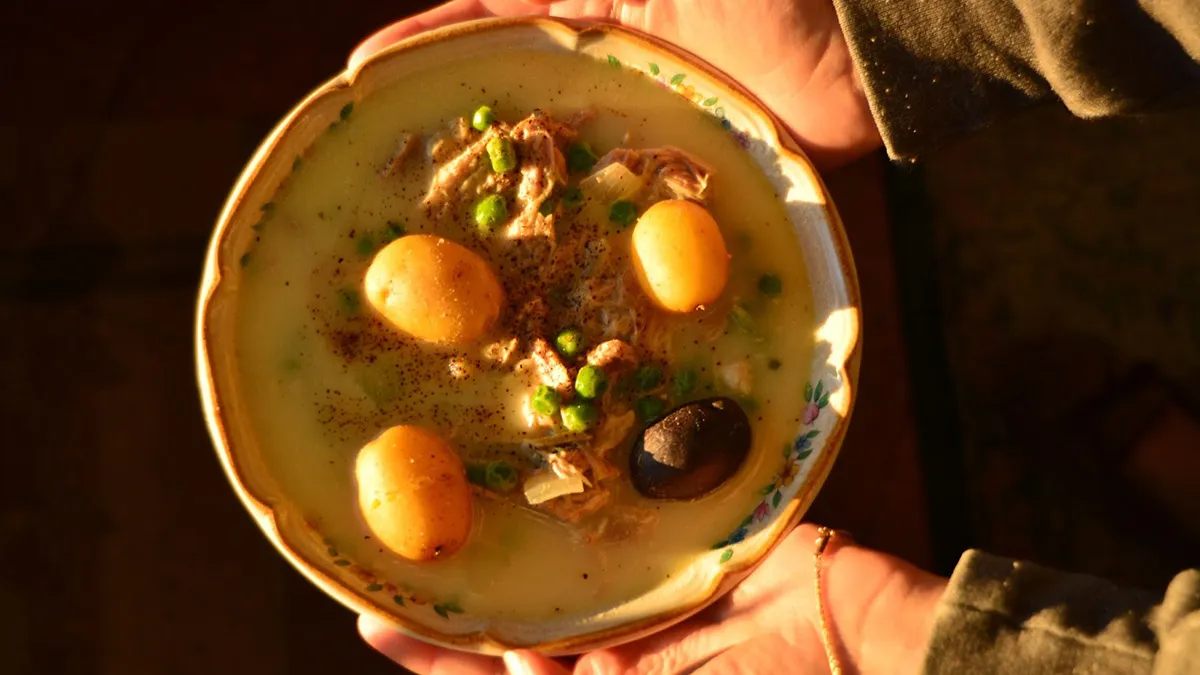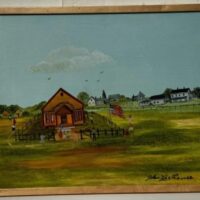Editor’s Note: A version of this story first appeared in The Good, the Bad, and the Elegy, a newsletter from the Daily Yonder focused on the best, and worst, in rural media, entertainment, and culture. Every other Thursday, it features reviews, retrospectives, recommendations, and more. You can join the mailing list at the bottom of this article to receive future editions in your inbox.
When it comes to pop culture, place, and identity, food plays a major role. Look no further than the breadcrumbs Guy Fieri has left at a variety of small-town diners, drive-ins, and dives across America.
Whether it’s the cooking shows we watch or the ways food connects us to where we live and who we know, there’s no doubt that food stories have a seat at the table in our ongoing consideration of rural media and entertainment.
In that spirit, my colleague Sarah Melotte was eager to share some thoughts on one of her favorite cookbooks. I hope you’ll find it a timely offering, as you prepare to attend or host this year’s batch of holiday gatherings and festive feasts, sure to be filled with family recipes and culinary comforts.
– Adam B. Giorgi
An Appalachian Journey
I’ll never forget when my cousin tried a boiled peanut for the first time. My mother took us to Bellews Country Store, where she buys local produce, jams, pickles, and, most importantly, boiled peanuts.
My cousin Sam is from Farmington, Michigan, a suburb of Detroit, but had come to South Carolina with his family to visit for Christmas. In his decade of life, Sam had never experienced the pleasure of biting into the softened shell of a boiled peanut, sucking out the salty water, and popping the nuts out of their pods.

It sounds gross if you’ve never tried it, and Sam was hesitant to give it a shot. But he was an adventurous youngster, and after just one try, he helped my sister and I devour a whole bag of goobers in the backseat of the car.
Witnessing someone discover a southern favorite made me realize that we had something special to offer the culinary world. I’ve since been drawn to cookbooks that highlight the diversity of the American South. My interest in food is part of what captivated me about farming when I was an undergraduate student.
While studying sustainable agriculture at Appalachian State University, I learned that the Blue Ridge Mountains are one of the most diverse food sheds in North America.
At the university’s research and teaching farm, we grew Jerusalem artichoke (a potato-like root vegetable), rhubarb, heirloom tomatoes, raspberries, and ginseng, among other crops. In the woods behind the farm, my forestry professor taught us how to identify trees, told us which understory plants we could eat, and that the goop squeezed out of jewel weed stalks is an effective topical treatment for poison ivy.
When I came across Ronni Lundy’s “Victuals,” a cookbook dedicated to Appalachian food, I was immediately drawn to the recipes, narratives, ingredients, and photographs.
Rural Roots
Ronni Lundy was born in 1949 in Corbin, Kentucky, a small mountain town in the eastern part of the state. Although her family moved to Louisville when she was still a toddler, they frequently visited family in Corbin, a place where Lundy recalls delicious memories like “Chilli buns carried out from the Dixie Pool Room wrapped snugly in red grease-slicked waxed paper” and honey “with a comb that my cousins and I would chew like gum.”

When Lundy was young, she realized that popular depictions of Appalachia were not only inaccurate, but hurtful and stereotypical. Think of TV shows like “Beverly Hillbillies” or the 1972 blockbuster, “Deliverance.” According to these depictions, Appalachians are backward, dirty, ignorant, and therefore deserving of mockery by mainstream American culture.
By telling the stories of real people instead of simplified characters, Lundy’s writing captures the heart of Appalachia. “Victuals” explores Appalachian cuisine through the eyes of the people who are making and shaping it.
From the town of a former salt mine in Southwest Virginia, to a farm that grows sorghum for syrup near my residence in Bakersville, North Carolina, Lundy shows the rest of America what it’s like to revel in the gift of Appalachian cookery. What some fear might be a dying culture, Lundy finds is not only alive, but thriving in the rural mountain communities of Southern Appalachia. In 2017, “Victuals” received two James Beard Awards.
The Virtue of Remembrance
Lundy’s accounts of present-day Appalachia are intertwined with her own personal memories of Corbin, Kentucky, calling on a food writing tradition that reminds me of 19th century French novelist, Marcel Proust. At the beginning of Proust’s “Swann’s Way,” Charles Swann dips a madeleine cookie into a cup of tea, a treat he enjoyed as a child. The taste of the madeleine cookie evokes memories vivid enough to fill the dense volumes of Proust’s seven-part collection of novels, “In Search of Lost Time.”
Even though most of us can’t write seven novels about memories evoked from a cookie, food-induced nostalgia is a feeling I suspect we can all relate to.
My paternal grandmother died when I was in high school, but my oldest sister and I demanded that we serve grandma’s mashed potatoes and gravy for several Thanksgivings following her passing. As my family passed around the bowl of mashed potatoes, it reminded us of other dishes she made, or her irreverent sense of humor, or what she’d talk about while we helped her cook.
The stories may not have been vivid enough to fill several novels, but they were vivid enough to fill us with laughter and tears for hours.
For the Melotte family, mashed potatoes and gravy was our madeleine cookie dipped in tea. For Lundy, it’s telling stories of Appalachian farmers and chefs. The reader learns as much about Lundy’s own memories as they do a rich and diverse food culture.
But “Victuals” dives deeper than the narrow scope of individual memory. Her writing includes memories that preserve culture. By reflecting on the influence of Native American traditions on Appalachian food, Lundy makes remembering not just a fun pastime, but a virtue.
One could never write holistically about any cuisine of the American South without mentioning corn. Lundy writes that Cherokee cultivation of corn was a game changer for early New World settlers. Unlike the grains popular in traditional European dishes, corn doesn’t require as many hands to grow it. It’s much less labor intensive and therefore more efficient.
She credits the Cherokee with establishing the Three Sisters Method, a popular planting technique in which corn, beans, and squash are co-planted together to produce a symbiotic ecosystem. Because of Cherokee influence, corn is a staple of the Appalachian diet. It’s the reason why I enjoy a hot pan of cornbread every time I make soup.
By remembering the origins of the ingredients in Appalachian dishes, we remember the people who are so often erased from portrayals of the region.
“Cultural memory is vital for people underserved by history,” says scholar Virginia Nazarea of the University of Georgia. In other words, for a people often forgotten in American history, like Indigenous Americans and the mountain folks of rural Appalachia, cultural memory is essential to preserving one’s identity and resisting the forces that attempt to define it from the outside.
For people on the margins, remembrance is resistance. When everyone else seems to say that Appalachian people are backward and ignorant, Appalachian cultural memory says they are diverse, creative, and community oriented. And Lundy’s “Victuals” says these are the food traditions that prove it.
“Victuals: An Appalachian Journey, with Recipes” is available wherever books are sold, in printed and ebook formats.
– Sarah Melotte
This article first appeared on The Daily Yonder and is republished here under a Creative Commons license.



